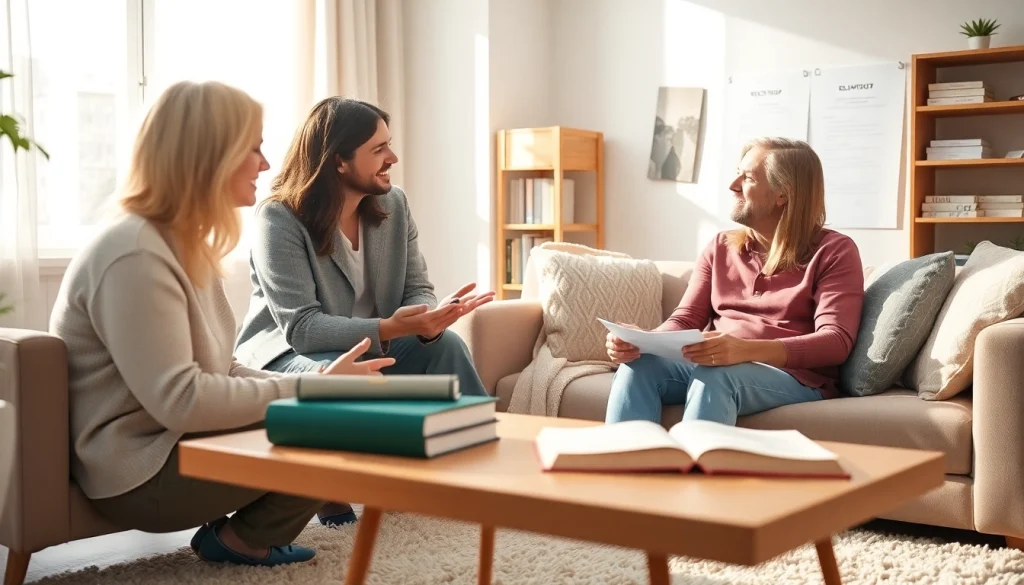
Understanding the Role of a Relationship Coach
What is a Relationship Coach?
A relationship coach is a trained professional who specializes in helping individuals and couples navigate the complexities of their personal relationships. Unlike therapists, who often focus on psychological issues and past traumas, relationship coaches work on practical strategies to enhance communication, resolve conflict, and build healthier relationships. This approach focuses on tangible outcomes and actionable steps, making it a popular choice for people seeking guidance in their romantic lives.
The Importance of Relationship Coaching
In today’s fast-paced world, where stress and distractions abound, many individuals find it challenging to maintain fulfilling relationships. Effective communication and emotional intelligence play crucial roles in relationship success, yet many people struggle in these areas. A relationship coach can provide invaluable support, helping clients to establish clear goals, improve interpersonal skills, and create healthy patterns of interaction. Coaching empowers individuals with the tools needed to foster deeper connections, ultimately leading to happier, healthier relationships.
Key Qualities of an Effective Relationship Coach
Not all relationship coaches are created equal. Effective coaches possess a unique blend of qualities that enable them to facilitate growth and healing. Here are some of the key attributes to look for:
- Empathy: The ability to understand and share the feelings of others is crucial in coaching settings.
- Communication Skills: Coaches must convey ideas clearly and effectively while also listening actively.
- Experience: A background in psychology, counseling, or social work can enhance a coach’s ability to address complex issues.
- Flexibility: Every relationship and individual is unique; successful coaches can adapt their approach to meet varying client needs.
Common Issues Addressed by Relationship Coaches
Communication Struggles Between Partners
One of the most frequent issues couples encounter is poor communication. Misunderstandings, unexpressed expectations, and differing communication styles can lead to resentment and conflict. A relationship coach helps clients develop effective communication techniques, which may include active listening, expressing needs clearly, and using “I” statements to reduce defensiveness. By practicing these strategies, partners can improve their dialogue, ultimately leading to a stronger bond.
Conflict Resolution Strategies
Conflict is an inevitable part of any relationship. Learning how to resolve disputes in a healthy manner is essential for long-term success. Relationship coaches often introduce clients to conflict resolution frameworks that emphasize understanding and compromise. Techniques might include identifying root causes of disputes, understanding each partner’s viewpoint, and developing a shared problem-solving approach. This skill set not only dissipates immediate tension but also cultivates a positive approach to future disagreements.
Navigating Major Life Changes Together
Life transitions such as moving in together, marriage, or welcoming a child can be both exciting and stressful. These changes can shift the dynamics of a relationship, and couples may struggle to adapt. A relationship coach can guide clients through these transitions, helping them discuss expectations, share concerns, and collaborate on new roles within the relationship. Through structured sessions, couples can build resilience together, learning how to face challenges as a united front.
How to Choose the Right Relationship Coach for You
Identifying Your Needs and Goals
Before searching for a relationship coach, it’s essential to identify personal needs and relationship goals. Are you facing communication issues, or do you want to enhance intimacy? Understanding your specific challenges will help you select a coach with the right expertise. Consider creating a list of expected outcomes; this will serve as a guideline throughout your coaching journey.
Researching Credentials and Experience
When selecting a relationship coach, investigate their qualifications and experience. Look for certifications from reputable coaching organizations, as well as backgrounds in psychology, counseling, or social work. A good coach should have a solid track record of helping clients with issues similar to yours. Reading testimonials and reviews can also provide insight into their effectiveness.
Assessing Personality Fit with Your Coach
Coaching is a highly personal process, and the rapport between a coach and a client significantly affects outcomes. Schedule initial consultations with prospective coaches to gauge compatibility. Pay attention to their communication style and openness. A supportive and empathetic coach can make the coaching experience more impactful and enjoyable.
What to Expect in a Relationship Coaching Session
Typical Session Structure and Flow
Relationship coaching sessions often follow a structured format. Generally, a session begins with a check-in, where clients discuss recent experiences or challenges. The coach then directs the conversation towards specific goals for that session, introducing valuable tools or strategies. Throughout, clients are encouraged to actively participate, sharing thoughts and feelings. The prominent goal is to ensure that each session leaves clients feeling heard and equipped to implement changes.
Tools and Techniques Used by Coaches
Relationship coaches utilize various tools and techniques tailored to their clients’ scenarios. Common methods include role-playing exercises, communication skills training, and assessments that gauge relationship dynamics. Coaches may also assign tasks or “homework” that encourages couples to practice new skills between sessions, fostering accountability and long-lasting change.
Measuring Progress and Success
Tracking progress in relationship coaching can be subjective and quantitative. Coaches may use self-assessment tools, checklists, or journals to help clients reflect on their experiences. Regularly revisiting goals set at the beginning of the coaching experience can provide a clear measure of growth. Celebrating small victories reinforces positive changes and motivates further progress.
Building Lasting Relationships with Coaching Support
Long-Term Strategies for Relationship Growth
Once clients have moved beyond initial challenges, a relationship coach can guide them in building sustainable practices that nurture their connection. Continuous learning is vital; couples can benefit from skills that foster vulnerability, empathy, and trust. Engaging in regular “relationship check-ins” can help maintain open communication, ensuring both partners feel valued and heard long after direct coaching sessions have concluded.
Integrating Coaching Concepts into Daily Life
Coaching concepts should not be confined to session time. Coaches often encourage clients to integrate new skills into everyday life. This might include setting aside time for meaningful conversations, practicing gratitude, or planning regular date nights. By weaving these practices into the fabric of daily life, the relationship can continue to evolve and improve organically.
Success Stories: Lasting Changes with a Relationship Coach
Many individuals and couples have experienced life-changing transformations through relationship coaching. Success stories often highlight improvements in communication, conflict resolution, and emotional connection. For example, a couple struggling with frequent arguments may learn to understand each other’s triggers. Over time, they develop strategies to approach disagreements constructively, ultimately reigniting their passion and commitment. These narratives serve not only as inspiration for prospective clients but also as a testament to the profound impact coaching can have on interpersonal connections.






